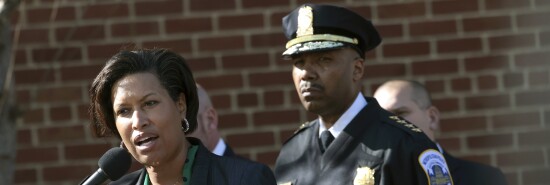
Mayor Bowser admits that masks fuel crime waves
Timothy P. Carney
Video Embed
Forty years ago, the D.C. City Council was worried about a resurgence of the Ku Klux Klan, so they passed an anti-mask law.
Three years ago, the D.C. City Council was worried about police mistreatment of black residents (and worried about COVID) and so they repealed the anti-mask law as part of a “criminal-justice reform” package in the wake of George Floyd’s death at the hands of Minneapolis police.
SPEAKERLESS HOUSE: THE LONGEST THE HOUSE HAS GONE WITHOUT A SPEAKER
Today, the mayor of Washington, D.C., is worried about the crime wave sweeping the district — particularly the surge in teenage criminals — and so she has proposed to restore the anti-mask law.
It’s quite a journey for the anti-mask law: It was passed to fight the KKK, repealed to fight racist policing, and now perhaps restored to protect the residents in mostly black neighborhoods. The law arguably violates the First Amendment, and it has never been consistently enforced. On the other hand, any honest observer will say that the rise in masking since mid-2020 has contributed to the crime wave in Washington, D.C., and some of the surrounding suburbs.
When I’ve witnessed teenagers walking into a D.C.-area CVS, filling their backpacks with bottles of expensive shampoo, and walking briskly out of the store, they have been masked teenagers. The massive epidemic of retail theft relies on people wearing masks so as to avoid detection by shoppers, clerks, and surveillance cameras. That’s why New York Mayor Eric Adams has called on stores to require shoppers to lower their mask upon entry.
Watch the videos of random street assaults and public transit shootings. The young assailants are wearing masks. It’s the same with the carjackers.
“Being anonymized has always been associated with more deviant and criminal behavior,” Bryanna Fox, a former FBI agent and criminology professor, noted. “People who wear masks feel more enabled and empowered to do things that they normally wouldn’t have done if their face was seen in public.”
Washington, D.C.’s 1982 anti-mask law didn’t ban wearing a mask in public. It only banned masking with the intent to break the law, or injure, intimidate, threaten, or abuse another person.
CLICK HERE TO READ MORE FROM THE WASHINGTON EXAMINER
Bowser has proposed that masking while committing a crime be an additional charge on top of the other charges.
I don’t know if anti-mask laws are effective, and I worry whether they infringe on free speech. Bans on masks might best be enforced by private businesses — no visible face, no entry. But I am cheered that a second U.S. mayor has acknowledged that masking causes crime.
